I Really Really Appreciate That This Person Went Off And I TRULY Do Think This Is A Conversation That
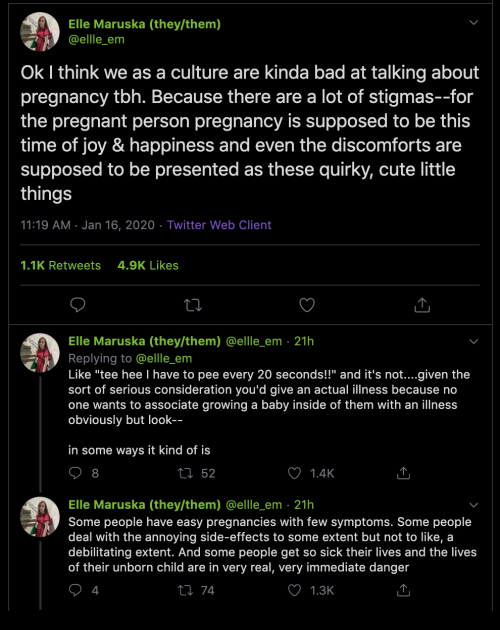


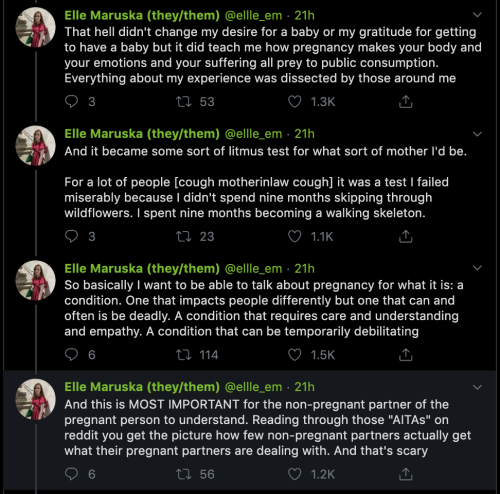
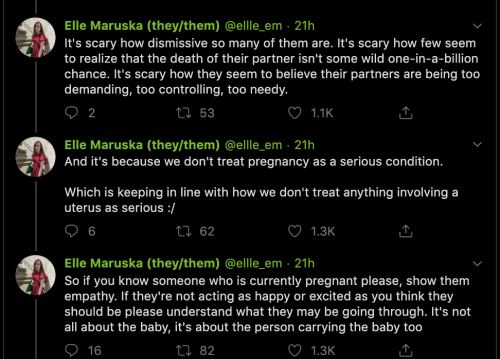
I really really appreciate that this person went off and I TRULY do think this is a conversation that needs to be had more and more.
I am not going to reiterate or repeat anything they said above, but I want to share my personal feeling on a subtler aspect of this issue.
People don’t want to talk about pregnancy as a potentially dangerous and lifethreatening condition because many of them believe it is necessary for a full and meaningful life. Unfortunately, many many of the people who believe this are not also the people who would be carrying the baby.
Our social narratives are all largely amatonormative, and beneath that, bioessential. That is, they operate on a sort of supremacy of the body, as well as the nuclear family narrative. What this means is that most people are raised and pressured into believing that a) having a baby is a MUST for a meaningful life (hidden agenda: have someone to take care of you when you’re old bc amatonormative society isolates family units and ostracizes seniors) and b) it is the birthing of the child that gives this meaning- no other form of childcare is meaningful.
Now before I go on I am NOT JUDGING anyone’s life, desires or dreams, I am critiquing the social narratives that we are raised with.
Anyway that last bolded point is why there;s all the talk in the world about ‘starting a family’ via childbirth and an entire industry geared towards enhancing fertility when pregnancies are not forthcoming (and many many people who stress themselves out trying to have a baby, feeling guilty or broken because the social and relationship pressures to fulfill this ideal) meanwhile adoption continues to be seen as a third- not second option. Present, living children are less important than the ideal of childbirth forced on people.
And I say ‘forced’ because it is an expectation. It is an ever-present social narrative. And it goes hand in hand with the fact that it is seen as taboo or shameful to talk about pregnancy as difficult, dangerous, and not necessarily all sunshine and smiles.
Mothers are shamed for feeling less than joyful about this very dangerous experience, and by that others are also shamed for feeling averse or apprehensive about pregnancy. It is an intentionally created false narrative that plays into the hands of patriarchy- because a grand amount of this pressure and related apathy (”oh it’s not a big deal, it’s just pregnancy!” says someone who isn’t carrying the baby..) continues to allow men to pressure women into having children (”THEIR” children– unlike, say, an adopted child) just so they can feel the pride of having sired a child (even though their contribution is oh so genetically and energetically small).
If we talked more honestly about pregnancy and childbirth, we might have to validate the concerns and lifestyles of uterus-bearing people who were expected to want to become pregnant. Men might have to just back down and shut up about wanting to create ‘kids of their own’ through someone else’s body. We as a people might have to think twice about acting as if pregnancy is inherently positive when this society is not actually capable of offering healthy supportive pregnancies to most pregnant people because a society that treats poor and black people this badly as well as one that isolates families into these tiny units isn’t capable of giving pregnant people the considerable care and support they need at such a precarious time.
Pregnancy is pregnancy– that’s it. Things do not inherently mean anything aside from the meaning we assign to them–therefore pregnancy and childbirth are not inherently positive nor is it necessary for a meaningful life.
When we do not speak openly and honestly about pregnancy, we are not letting people make informed choices about their bodies; this is not informed consent.
Bonus:

Links:
https://www.amazon.com/hz/wishlist/ls/4H671VB55LY5?ref_=wl_share
https://ko-fi.com/ellegato
More Posts from Goneau2xr and Others
How Long is this Fic Really?: A Guide
Word count in the HP Series:
Sorcerer’s Stones: 76,944 Chamber of Secrets: 85,141 Prisoner of Azkaban: 107,253 Goblet of Fire: 190,637 Order of the Phoenix: 257,045 Half-Blood Prince: 168,923 Deathly Hallows: 198,227
Word count in the LOTR Series:
The Hobbit: 95,022 Fellowship of the Ring: 177,227 Two Towers: 143,436 Return of the King: 134,462
Quatre: Okay, if I’m killed what do you do?
Duo: Avenge you.
Quatre: Wait, what?
Trowa: Go after their children.
Quatre: NO, YOU GO ON WITHOUT ME!
Relena: What’s going on?
Duo: Heero may have died.
Relena: Heero MAY have died?!
Wufei: We’re still looking into it.
Enlisted Ranks: Army
There’s nothing I hate more than a story that didn’t even try to get its ranks right. Why is a major giving orders to a colonel? Why is a first sergeant working with a bunch of fuzzies? Why the hell did you just call the sergeant major ‘sir’?
Military ranks are different across the branches, but if your story features the U.S. Army, here’s a breakdown of enlisted ranks and rank etiquette. (other branches coming soon!)
Basics Ranks in the army follow a numerical pattern, so if you’re ever not quite sure what the name of the rank higher is, you can reference them by nomenclature. E-series: E stands for enlisted. This refers to soldiers from private to sergeant major. O-series: O stands for officer. This refers to soldiers from second lieutenant to general. O-series post coming soon! W-series: W stands for warrant officer. This refers to soldiers from warrant officer 1 to chief warrant officer 5. W-series post coming soon! In ACUs, (army combat uniform) the rank is worn in the center of the chest via a velcro patch. In class-A uniforms, the rank is worn on the shoulder. Each pay grade earns slightly more per month than the one before it. Officers make significantly more money per month than enlisted. Time in service also affects pay, meaning a sergeant who’s been in six years will make more than a staff sergeant who’s been in three years.
E-1: Private Most people who enlist come in at E-1 unless they were in JROTC, have a college degree, or performed some other feat with their recruiters prior to enlisting i.e. volunteer work, good P.T. scores, etc. This is the lowest pay grade and has no rank. Soldiers who are E-1s do not wear a rank. also known as: PV1, fuzzy (because they wear no velcro rank, there’s a patch of bare fuzz in the middle of their uniform. You can buy a patch to cover it.) Title: Private, PV1 E-2: Private Yes, there are two ranks by the name of private. You reach E-2 automatically after six months of enlistment. If you enroll in the Delayed Entry Program or have an acceptable P.T. card with your recruiter, you can enlist as an E-2 instead of an E-1. At E-2, you more or less have no more power than an E-1. also known as : PV2 Title: Private, PV2
E-3: Private First Class The final “private” class. You reach E-3 automatically after 12 months of enlistment, assuming you’ve been an E-2 for at least four months. If you were in JROTC for four years, you enter automatically at this rank. This rank still doesn’t have much power, but may be put in charge of other privates and may assist their team leader with tasks, and on occasion may be a team leader themselves. also known as : PFC Title: Private, PFC. E-4: Specialist/Corporal The last “junior enlisted” class. You reach specialist automatically after 24 months of enlistment, assuming you’ve been a PFC for at least six months. If you enlist with a completed four year college degree, you can start out as an E-4 instead of an E-1. Specialists tend to be team leaders and may be in charge of other specialists and privates. When no NCOs are present, the senior specialist is in charge.
Corporal, while technically the same pay grade as specialist, is actually an essentially higher rank. It’s a special rank only bestowed on those who are in leadership positions and are awaiting the appropriate time in service/time in grade to be promoted to sergeant. Corporals are considered NCOs while specialists are considered junior enlisted. Strictly speaking corporals and specialists are the same rank, but in most situations, corporals out rank specialists. also known as: shamshields, (specialist only) SPC, CPL Title: Specialist, Corporal —
Intermission!
Man, all of that text is boring. Let’s break it up a bit with some rank etiquette, shall we?
• Lower enlisted (E-1 thru E-4) tend to call each other by their surname regardless of rank. Even an E-1 will probably be calling a specialist just by their name. The exception is Corporals, who are considered NCOs and are referred to by rank.
• E-5 and above are referred to as “NCOs,” or non-commissioned officers.
• NCOs with similar ranks might call each other by their surnames and will call lower enlisted by their surnames. When discussing another NCO with a lower enlisted, they will use that NCO’s proper rank. So a sergeant speaking to a PFC will say “Sergeant Smith needs you,” not “Smith needs you.” Freshly promoted sergeants who still hang out with lower enlisted might not mind their friends calling them their surnames in private, but formally and professionally they’re expected to address their senior properly.
• Lower enlisted ranks are often called “joes,” especially when an NCO is addressing another NCO about their squad or platoon. “Have your joes had chow yet?” = “Have the soldiers directly under your command eaten yet?”
• It’s considered inappropriate for lower enlisted to hang out with NCOs and it’s discouraged, especially in the work place.
Are you all rested up? Great! Let’s get back to the ranks.
—
E-5: Sergeant
Finally: the NCO ranks! Unlike the previous ranks, you cannot automatically rank up to sergeant. You must attend special courses and be seen by a promotion board where you’ll be expected to recite the NCO creed and have knowledge appropriate for an non-commissioned officer. From this rank on, lower-ranked soldiers will refer to you as “sergeant” and you will likely be a squad leader or in another leadership position.
• Lower enlisted do NOT refer to sergeants by their surname unless it is paired with their rank. “Sergeant Smith,” not just “Smith,” or your private will be doing a lot of push-ups.
• No one calls them “Sarge.” Like… just don’t do it friends.
• Some pronounce sergeant in such a way it sounds as though the g is dropped entirely. Ser-eant, or phonetically, “saarnt.”
also known as: SGT
Title: Sergeant
E-6: Staff Sergeant
Sergeant Plus. You probably will have similar responsibilities to an E-5, meaning probably a squad leader unless you need to fill in for a platoon sergeant. Don’t misunderstand; in lower enlisted ranks, private and private first class aren’t that much of a difference. E-5 and E-6 are a definite difference though. It is acceptable to call an E-6 either “sergeant” or “sergeant (name)” instead of staff sergeant.
also known as: SSG
Title: Sergeant
E-7: Sergeant First Class
At this point the ranks become known as “senior NCO.” E-7 and above cannot be demoted by normal means. It actually requires a court martial or congressional approval to demote an E-7. Like, it’s surprisingly hard to demote people after this point. I once knew an E-7 who got busted with a DUI and STILL didn’t lose his rank.
Anyway, it’s still appropriate to call an E-7 “sergeant” or “sergeant (name)” instead of sergeant first class. SFCs may be platoon sergeants or in some circumstances may hold a first sergeant position. While positioned as a first sergeant, they should be referred to as “first sergeant.” Unless you work at battalion level or higher, this is probably the highest NCO rank you’ll interact with regularly, and in some cases interacting with an E-7 can be as big a deal as interacting with an E-8.
also known as: SFC
Title: Sergeant
E-8: First Sergeant/Master Sergeant
Another dual-rank. First sergeants are the NCO in charge of a company and are usually the highest ranking NCO soldiers will interact with regularly. They run the company alongside the company commander. All NCOs answer to them and most beginning of the day and end of the day formations will be initiated and ended with them. It is only appropriate to refer to a first sergeant as “first sergeant” or “first sergeant (name).” Do not just call them “sergeant.”
Master sergeants are E-8s who are not in a first sergeant position. Typically these people wind up working in offices in battalion or brigade. It’s only appropriate to refer to a master sergeant as “master sergeant” or “master sergeant (name).”
also known as: 1SG, FSG, (first sergeant only) MSG (master sergeant only)
Titles: First Sergeant, Master Sergeant.
E-9: Sergeant Major or Command Sergeant Major
We finally reach the end of the list: Sergeant Major, the highest ranking NCO. Sergeant Majors will be found at battalion level and higher. Command Sergeant Majors are those that hold a leadership position in a battalion, brigade, etc, like first sergeant vs master sergeant. It is appropriate to refer to E-9s as “sergeant major” or “sergeant major (name).” Typically, a command sergeant major will be referred to AS command sergeant major.
In the U.S., the plural form of sergeant major is “sergeants major.” Outside the U.S., “sergeant majors” can be correct.
also known as: SGM, CSM
Title: Sergeant Major
Now, for the most important announcement:
Soldiers NEVER, and I mean NEVER, refer to an NCO as “sir” or “ma’am.” Forget what the movies tell you; if your first sergeant is chewing you out, you do not say “ma’am, yes ma’am!” You’ll earn yourself some push-ups and some cleaning duty and probably a counseling. Do you see how under every rank I’ve provided a “title” section? That’s how your soldiers address that rank. Period. The only people who get called “sir” and “ma’am” are civilians and officers. Cannot tell you how many movies I’ve rolled my eyes into my skull because some snot-nosed private is calling their squad leader “sir.” Please cease this immediately. Thank you.
That’s all for scriptsoldier’s rank breakdown of enlisted ranks! Stay tuned for our breakdown of officers, warrant officers, and how your rank affects your standing in your unit!
Heero: I asked Relena to share her queen size blanket.
Heero: To which she replied that she was a queen and therefore the blanket was already at max capacity.
Duo: Time sensitive question - will geese kill if provoked?
Trowa: What did you do?
Duo: We both know the answer to that, Tro.



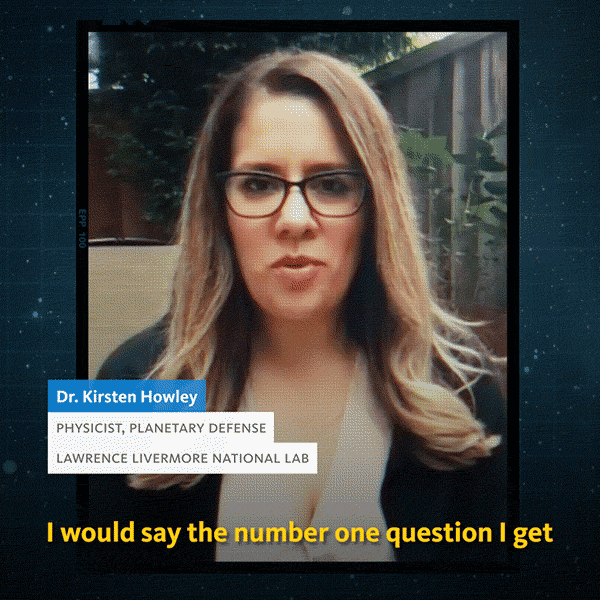




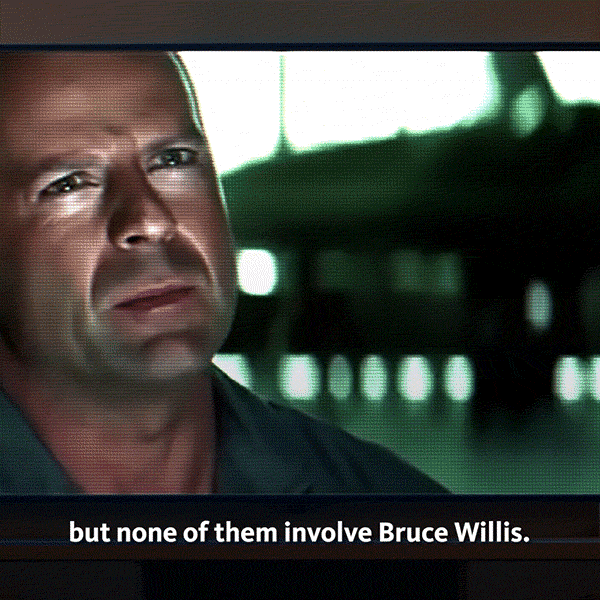
What Hollywood gets wrong (and right!) about protecting the Earth from asteroids
In the 1998 movie, “Armageddon,” an asteroid the width of Texas is about to hit Earth. The heroes who stop it in just the nick of time are a group of orange-suited Americans, all men.
Life isn’t always like the movies.
Not that an asteroid couldn’t slam into Earth, mind you. Asteroids — mostly tiny ones — pass by our planet virtually every second. But the people charged with stopping the big ones aren’t reaching for their spacesuits with mere hours to spare.
And spoiler alert: They also aren’t all men.
“I would say the number one question I get when I tell people what I work on, is ‘Oh, like ‘Armageddon?’’ And it’s nothing like ‘Armageddon,’” says Lawrence Livermore National Lab physicist Kirsten Howley, whose day job includes defending our planet from asteroids.
Howley doesn’t have an orange jumpsuit at hand, but her job is serious business. She and her team of planetary defenders specialize in how we might deflect an asteroid that poses a threat to Earth.
Read more
Words to replace said, except this actually helps
I got pretty fed up with looking for words to replace said because they weren’t sorted in a way I could easily use/find them for the right time. So I did some myself.
IN RESPONSE TO Acknowledged Answered Protested
INPUT/JOIN CONVERSATION/ASK Added Implored Inquired Insisted Proposed Queried Questioned Recommended Testified
GUILTY/RELUCTANCE/SORRY Admitted Apologized Conceded Confessed Professed
FOR SOMEONE ELSE Advised Criticized Suggested
JUST CHECKING Affirmed Agreed Alleged Confirmed
LOUD Announced Chanted Crowed
LEWD/CUTE/SECRET SPY FEEL Appealed Disclosed Moaned
ANGRY FUCK OFF MATE WANNA FIGHT Argued Barked Challenged Cursed Fumed Growled Hissed Roared Swore
SMARTASS Articulated Asserted Assured Avowed Claimed Commanded Cross-examined Demanded Digressed Directed Foretold Instructed Interrupted Predicted Proclaimed Quoted Theorized
ASSHOLE Bellowed Boasted Bragged
NERVOUS TRAINWRECK Babbled Bawled Mumbled Sputtered Stammered Stuttered
SUAVE MOTHERFUCKER Bargained Divulged Disclosed Exhorted
FIRST OFF Began
LASTLY Concluded Concurred
WEAK PUSY Begged Blurted Complained Cried Faltered Fretted
HAPPY/LOL Cajoled Exclaimed Gushed Jested Joked Laughed
WEIRDLY HAPPY/EXCITED Extolled Jabbered Raved
BRUH, CHILL Cautioned Warned
ACTUALLY, YOU’RE WRONG Chided Contended Corrected Countered Debated Elaborated Objected Ranted Retorted
CHILL SAVAGE Commented Continued Observed Surmised
LISTEN BUDDY Enunciated Explained Elaborated Hinted Implied Lectured Reiterated Recited Reminded Stressed
BRUH I NEED U AND U NEED ME Confided Offered Urged
FINE Consented Decided
TOO EMO FULL OF EMOTIONS Croaked Lamented Pledged Sobbed Sympathized Wailed Whimpered
JUST SAYING Declared Decreed Mentioned Noted Pointed out Postulated Speculated Stated Told Vouched
WASN’T ME Denied Lied
EVIL SMARTASS Dictated Equivocated Ordered Reprimanded Threatened
BORED Droned Sighed
SHHHH IT’S QUIET TIME Echoed Mumbled Murmured Muttered Uttered Whispered
DRAMA QUEEN Exaggerated Panted Pleaded Prayed Preached
OH SHIT Gasped Marveled Screamed Screeched Shouted Shrieked Yelped Yelled
ANNOYED Grumbled Grunted Jeered Quipped Scolded Snapped Snarled Sneered
ANNOYING Nagged
I DON’T REALLY CARE BUT WHATEVER Guessed Ventured
I’M DRUNK OR JUST BEING WEIRDLY EXPRESSIVE FOR A POINT/SARCASM Hooted Howled Yowled
I WONDER Pondered Voiced Wondered
OH, YEAH, WHOOPS Recalled Recited Remembered
SURPRISE BITCH Revealed
IT SEEMS FAKE BUT OKAY/HA ACTUALLY FUNNY BUT I DON’T WANT TO LAUGH OUT LOUD Scoffed Snickered Snorted
BITCHY Tattled Taunted Teased
Relena: *appears in field of vision*
Heero: *internally* my favorite person has arrived she is pretty and smart and my favorite I must greet her in a manner indicative of my appreciation for her existence
Heero: I’ll kill you.
-
 a-cosmonaut-or-an-astronaut liked this · 9 months ago
a-cosmonaut-or-an-astronaut liked this · 9 months ago -
 starlitvalkyrie liked this · 11 months ago
starlitvalkyrie liked this · 11 months ago -
 deathofrats reblogged this · 1 year ago
deathofrats reblogged this · 1 year ago -
 deathofrats liked this · 1 year ago
deathofrats liked this · 1 year ago -
 i-love-dragonss reblogged this · 1 year ago
i-love-dragonss reblogged this · 1 year ago -
 confused--polarity reblogged this · 1 year ago
confused--polarity reblogged this · 1 year ago -
 andromeda-or-andromache-maybe reblogged this · 1 year ago
andromeda-or-andromache-maybe reblogged this · 1 year ago -
 unimpressivebaby liked this · 1 year ago
unimpressivebaby liked this · 1 year ago -
 yearningwitherrors liked this · 1 year ago
yearningwitherrors liked this · 1 year ago -
 ourvisiontouchedthesky liked this · 1 year ago
ourvisiontouchedthesky liked this · 1 year ago -
 sketch-ice reblogged this · 1 year ago
sketch-ice reblogged this · 1 year ago -
 sketch-ice liked this · 1 year ago
sketch-ice liked this · 1 year ago -
 thegoddamnwordsmith reblogged this · 2 years ago
thegoddamnwordsmith reblogged this · 2 years ago -
 thegoddamnwordsmith liked this · 2 years ago
thegoddamnwordsmith liked this · 2 years ago -
 thisistabsreblogs reblogged this · 2 years ago
thisistabsreblogs reblogged this · 2 years ago -
 strawberrycatworld reblogged this · 2 years ago
strawberrycatworld reblogged this · 2 years ago -
 strawberrycatworld liked this · 2 years ago
strawberrycatworld liked this · 2 years ago -
 patisserieblu reblogged this · 2 years ago
patisserieblu reblogged this · 2 years ago -
 patisserieblu liked this · 2 years ago
patisserieblu liked this · 2 years ago -
 secretly-fluff reblogged this · 2 years ago
secretly-fluff reblogged this · 2 years ago -
 gale--dekarios liked this · 2 years ago
gale--dekarios liked this · 2 years ago -
 smallhappiness23 liked this · 2 years ago
smallhappiness23 liked this · 2 years ago -
 notveryrussian reblogged this · 2 years ago
notveryrussian reblogged this · 2 years ago -
 notveryrussian liked this · 2 years ago
notveryrussian liked this · 2 years ago -
 whitemochacoffee reblogged this · 2 years ago
whitemochacoffee reblogged this · 2 years ago -
 rahhhhhrs reblogged this · 2 years ago
rahhhhhrs reblogged this · 2 years ago -
 rahhhhhrs liked this · 2 years ago
rahhhhhrs liked this · 2 years ago -
 sintheyokai reblogged this · 2 years ago
sintheyokai reblogged this · 2 years ago -
 yoshi-g-teh-first reblogged this · 2 years ago
yoshi-g-teh-first reblogged this · 2 years ago -
 yoshi-g-teh-first liked this · 2 years ago
yoshi-g-teh-first liked this · 2 years ago -
 thyholybread liked this · 2 years ago
thyholybread liked this · 2 years ago -
 professor-glasses reblogged this · 2 years ago
professor-glasses reblogged this · 2 years ago -
 professor-glasses liked this · 2 years ago
professor-glasses liked this · 2 years ago -
 faemorningstar liked this · 2 years ago
faemorningstar liked this · 2 years ago -
 oatballsoffury reblogged this · 2 years ago
oatballsoffury reblogged this · 2 years ago -
 oatballsoffury liked this · 2 years ago
oatballsoffury liked this · 2 years ago -
 chaoticgirl23 liked this · 2 years ago
chaoticgirl23 liked this · 2 years ago -
 mysecretwindowuniverse liked this · 2 years ago
mysecretwindowuniverse liked this · 2 years ago -
 leospecter24 liked this · 2 years ago
leospecter24 liked this · 2 years ago -
 acornered reblogged this · 2 years ago
acornered reblogged this · 2 years ago -
 galaxyfish liked this · 2 years ago
galaxyfish liked this · 2 years ago

Go away, there's nothing for you here. I ship Duo and Relena and you'll pry my rarepair from my cold dead hands.
259 posts